Zoltán Szilágyi Jew's harp maker
"I Gave Sounds to Mankind: Interview with Zoltán Szilágyi Jew's Harp Maker"
Written by Áron Szilágyi
Published on 17th March 2014
Although I am not a journalist I could not resist the temptation to make this interview with my father who has not opened up to the media for a very long time. When it comes to Jew's harps I am a kind of an expert, not to mention the strong family ties with my interviewee, therefore this little question and answer session will hopefully have a lot to offer. I visited him in his workshop in Kecskemét where we talked about how it all began, how it was to be a rebel during the socialist era, the spiritual value of musical instruments and quantum physics.
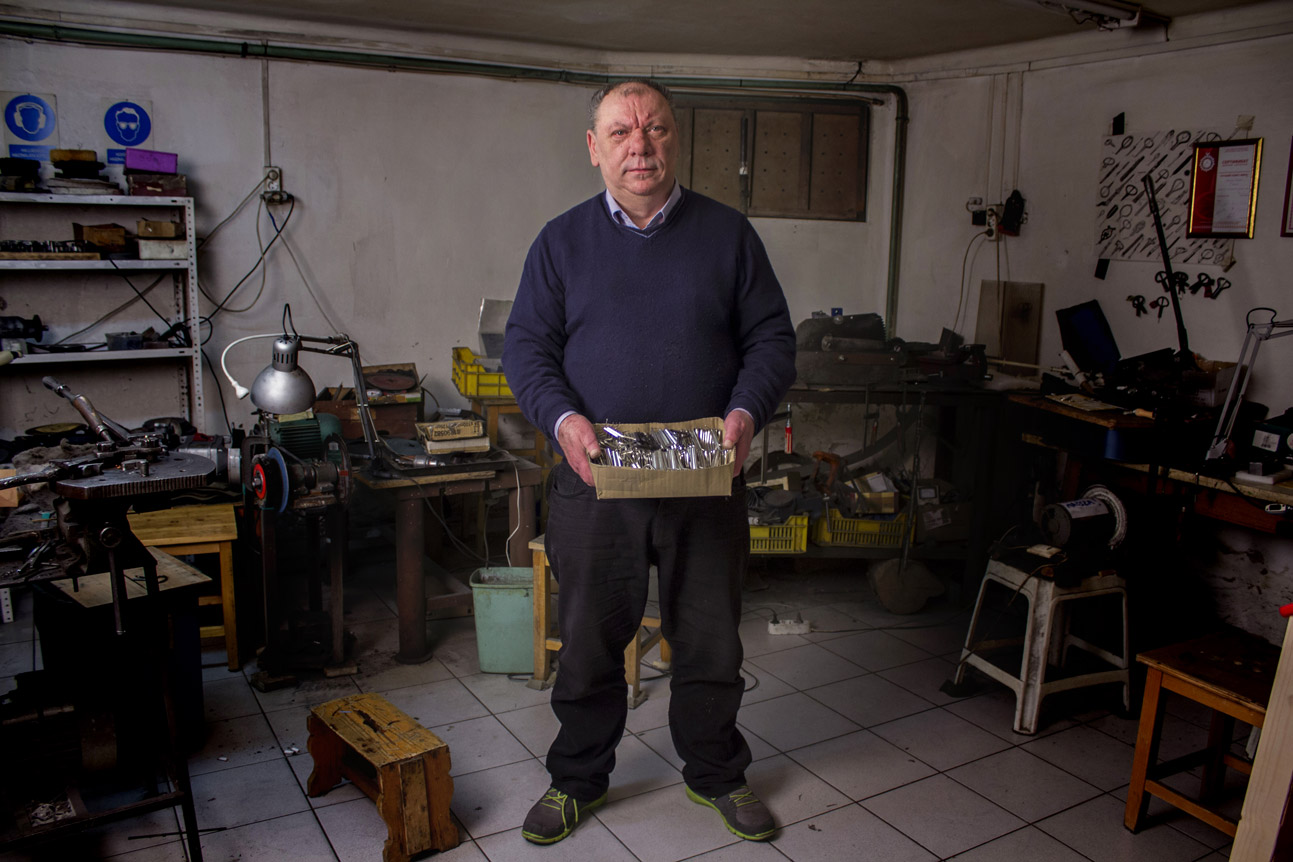
Zoltán Szilágyi Jew's harp maker was born in 1950 in Kiskőrös, Hungary. His musical instruments are known all over the world and are used in such prominent institutions like The Walt Disney Studios, The Globe Theater in London and many more, not to mention the individual musicians, of course..
How did you come across the Jew's harp? Was music an essential part of your life before you became a Jew's harp maker? Can you remember the first time you heard a Jew's harp?
Music was part of my parents' life on a daily basis. My mother played different instruments, it was quite natural that they played music every day and so it was obvious for me to connect to this somehow through playing music or singing. When I was eight I had piano lessons and I also learnt to play the recorder which was an integral part of my life until I was 30-31.
Around 1974 I was working in a library but I somehow felt out of place there and I started to look for such opportunities and possibilities where I could express myself as a musician.
I was 23 when I first heard a Jew's harp on a foreign radio program, that was the first encounter. Of course, I didn't know what kind of instrument it was but it reminded me of the sound of a turbojet plane. At that time I was very much into sport flying so the answer came to me relatively quickly: the sound of the propeller is created when high-pressure air meets low-pressure air. Based on this I began to experiment and develop and so it happened that after a year and a half I figured out the physics of the Jew's harp, needless to say, that I still had not seen one yet, of course.
So, was there anybody to help you make Jew's harps, did you have a master to teach you the tricks of craftsmanship?
I buried myself in books, I was seeking pictures, sounds and looked for masters but did not find one. There I was, left on my own trying to gather all the information to guide me through my work. I had to figure out everything from the first phase to the end product. I have to admit though that there were certain advantages of this lonesome adventure: one has to find rare and unusual solutions for their questions. So, eventually, at the end of my inner pilgrimage, I managed to create a functioning Jew's harps.
Back then you were a librarian. How did you get used to working with steel? How did you learn to use the necessary tools? Had you learnt anything about working with metals before?
My original profession being a typographer I have already known lead but steel was different, of course. As a librarian, I had to deal with letters, paper, books but I figured that steel is a very friendly, velvety, even silky material. Just think about it: iron, the basic material of steel comes from the inside of stars, it is synthesized in huge hypernovas. So how could I be neutral with such a material that was born in the cosmos? Steel is a very friendly and kind material but I had to learn how to work with it. One can talk to it and if the person is nice enough it takes the shape one was dreaming about. The tools I use for making the instruments were designed and created by myself.
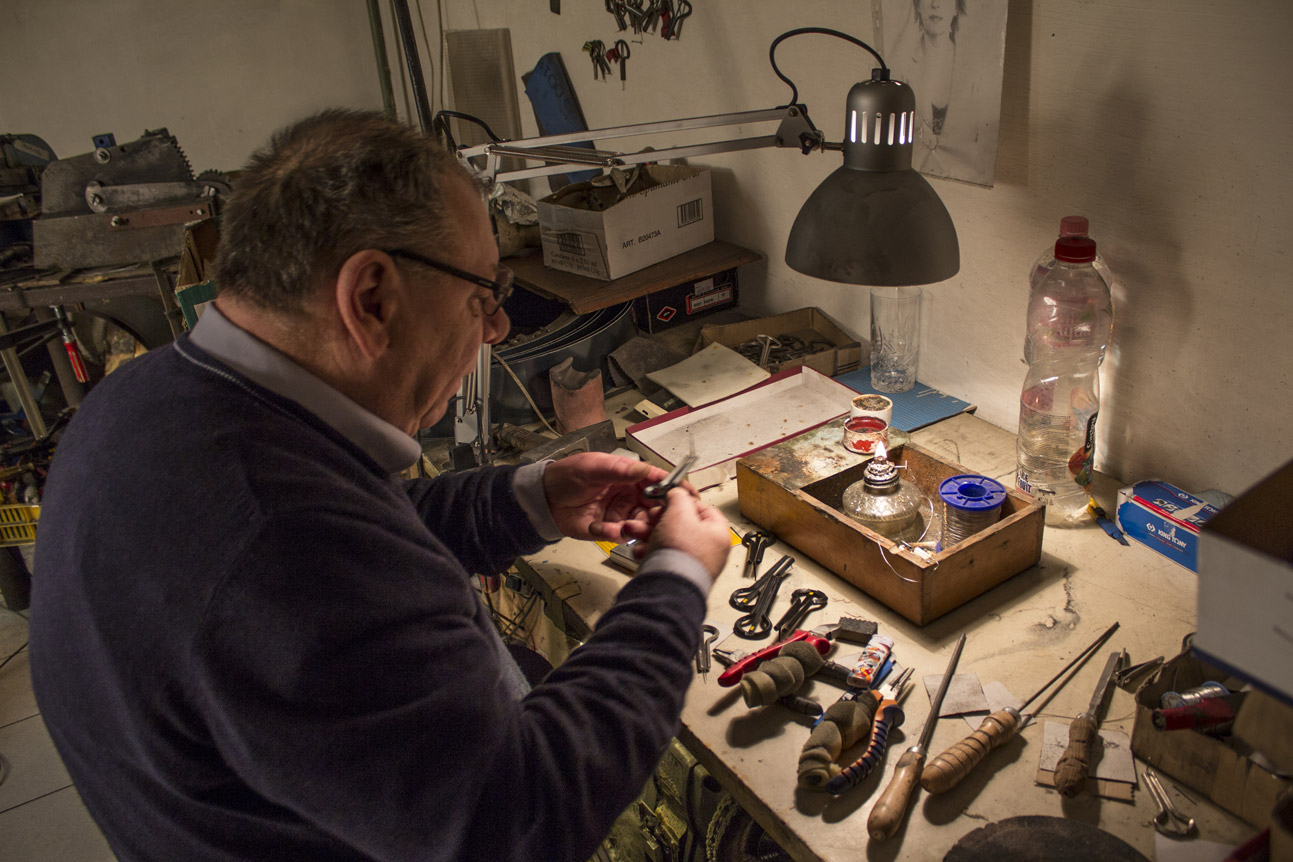
He started making Jew's harps in a shed of a long-demolished building in 1976. Having created thousands of them he felt they were good enough to be ready to be shown to others. He still uses some of the tools he started with almost 40 years ago and his workshop is still a humble place as it has always been.
What kind of cultural environment inspired you to become a self proprietor?
When I was a young man I got acquainted with all sorts of artists, in fact, I was also a self-made poet and artist, I did folk dance, wrote music and song lyrics and so on. Back in those years (1966-68) there was an alternative group of artists in Kecskemét which we called Purgatory. This artistic community was perfect for us to express ourselves freely, together and through art, to communicate something that other ways was not possible. There was painting, sculpting, poetry, music and performances. Later on the hard core of this group became the center of Vajda Lajos Studio in Szentendre. Those people who were part of this back then and worked together and tought together still share the same spirit and similar ideas like they held 30, 40 or 46 years ago. I think the basis of art is utter honesty. Art cannot stand dishonesty in music, painting or sculptures. We were sort of cultural samurais, loyal to ourselves and our views and we fought for our own rights against the city hall and its cultural department.
"We were cultural samurais."
Was it ok in that political system to have such an unusual profession?
Well, I have always had a different attitude straight from my childhood. I was a bright student of course but a problematic one. My way of thinking and behavior was different.
There was no such law in the constitution of the People's Republic of Hungary that would require the permission of Stalin, Khruschev or Bresnjev to make Jew's harps. It was surprising for them though that I left a perfectly decent middle-class job and tried to fulfill my goals. But then again, maybe it is always a bit surprising when somebody has their own ideas and does their best to reach their goal in life, they go against the flow, against the mainstream.
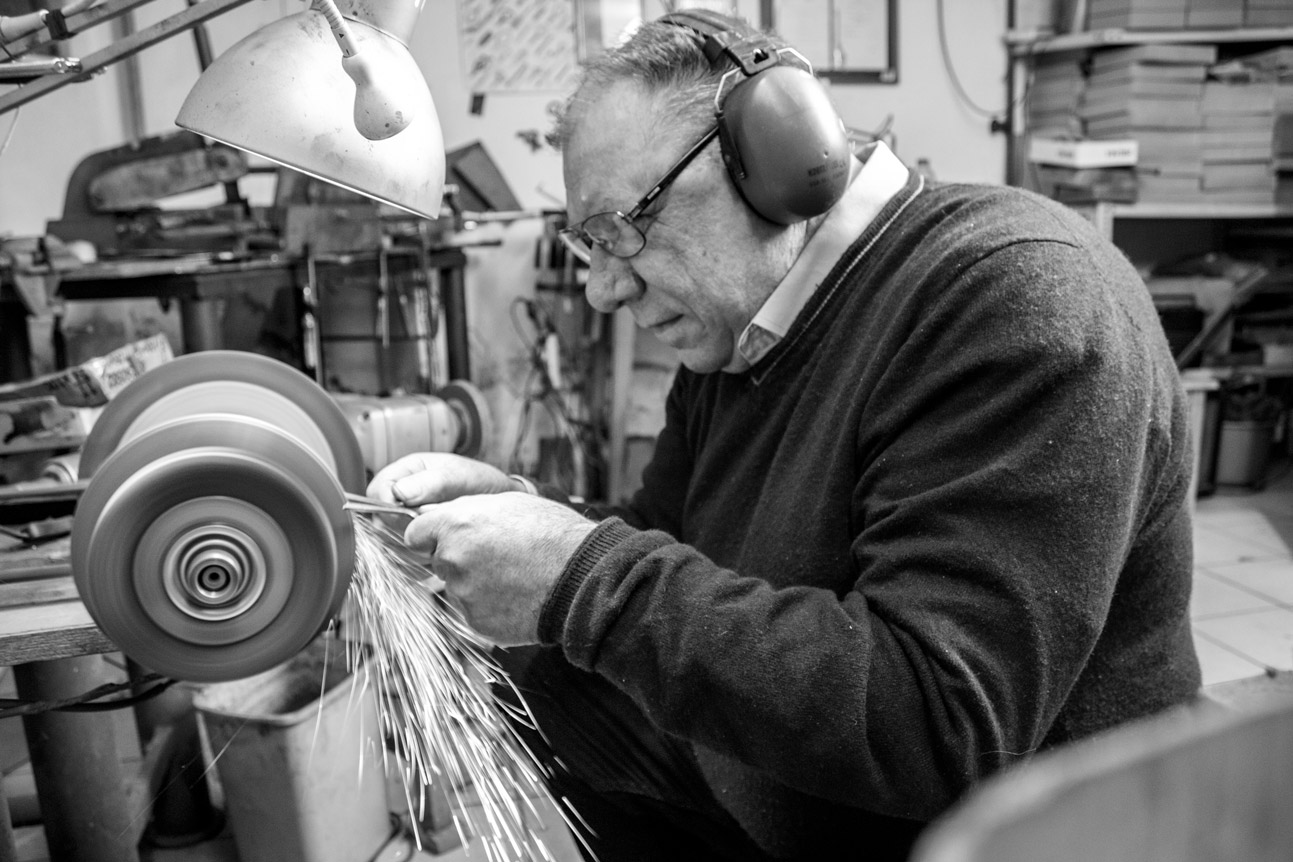
His jew's harps are not traditional, he never had a master, he started his craftsmanship in a vacuum of information that lead to completely new methods.
When you started making Jew's harps did you give up on your other artistic intentions or did you carry on writing, playing music and painting?
Jew's harps came to my life like new love, in other words like lightning or a meteorite collision more like. After two or three years of experimental action, I decided to dedicate my life to making these instruments and I started selling them on the mass market. I gave up all other artistic hobbies and my new aim became to bring back this long-forgotten musical instrument from the dead and Jew's harp music could become once again part of Hungarian folk music. I also felt keen to make Jew's harp more popular than the recorder as it provides more possibilities for people to express themselves in music more instantly and spontaneously. It is also small, pocket-sized and it isn't too loud, in fact, it has a very nice, gentle, caressing sound, unlike recorders, trumpets or the likes. So it is from all aspects of an anthropocentric instrument, the Hungarian education system should have discovered it ages ago.
How did you introduce your instruments to musicians? How did they end up with the end-users? Who was your first client?
In 1976-77, the early years of experimenting I was already known to a certain extent so a young musician couple from Holland found me and bought a couple of the experimental pieces. They were my first clients. In 1978 I was finally invited to a folk art fair here in Kecskemét where my Jew's harps sold out in no more than a couple of hours. This was extremely motivating for me. After that, I had a regular stall at these fairs all around the country so I could sell tens of thousands of Jew's harps that I created myself.
This must have had something to do with the thriving folk dance movement in Hungary at the time?
Absolutely, yes. The aims of Ferenc Sebő and co were very similar to the mission of the Jew's harp's original musical and cultural mission: to re-introduce this ancient musical instrument into folk music, music and to everyday life. The folk dance movement was a fantastic background for this.
"Music connects us with God and I reckoned this is such a strong connection and power that cannot ever be out-ruled by earthly guns."
Did the political transition in Hungary lead to any change in your life?
The minute I have managed to reach the ideal quality of my Jew's harps I patented the technology and entered the domestic market. I got in touch with the CEO of Trial (a large toy trader back then in Hungary) who really liked it and thought it had a potential chance on the Hungarian musical instrument assortment. So we clinched a deal and I started producing in bulk for them. This was vital as more and more people got to know my instruments, and they wanted more: new ones, with a different sound, different types that needed to be handled differently. So it happened that there became collectors both in Hungary and abroad. My most eager collector has more than a thousand Szilágyi Jew's harps. It is also very interesting how people's mentality changed with the transition. This was the end of something and it was very challenging. In the nineties, it was either a breakup or a challenge for individuals on their personal level. Since I was dealing with such a classical thing as music and instruments the transition years didn't really change anything in my life or existential strategy. I somehow figured that up until there are at least two people left on the Earth one will enjoy music and music connects us with God and I reckoned this is such a strong connection and power that cannot ever be out-ruled by earthly guns, swords or mobile phones.
After the '90s more and more foreign Jew's harp players contacted you personally among whom there was the extravagant musician: Anton Bruhin who represented a completely different style than the traditional players. Did you find new demands in music inspiring?
It was also part of the transition that the borders opened up and with that new perspectives appeared in culture and on a state level as well, not to mention people's mentality and heart, of course. The news of my instruments was spreading ever so fast and more and more people wanted to meet me in person. Visitors appeared from nearly all the continents among whom there was Anton Bruhin too. He is a really outstanding musician and of course, he inspired me greatly too but my own inner voices too triggered and created newer and newer models.
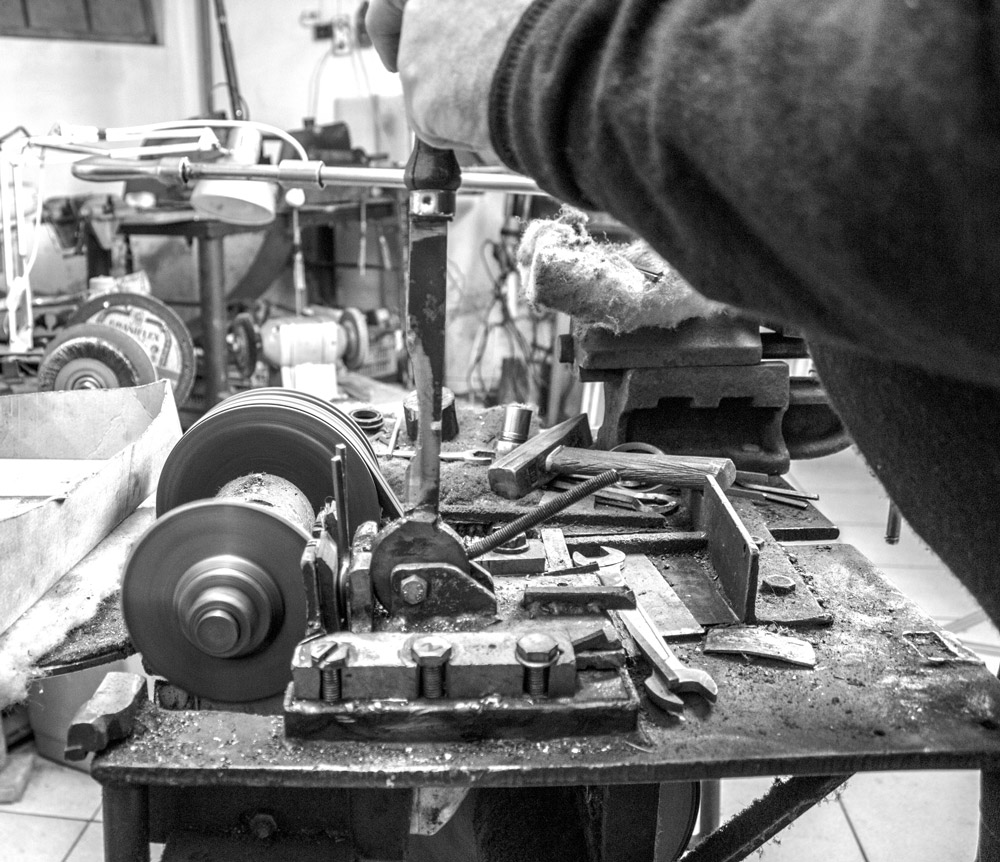
All his tools were designed and created by himself. He invented such devices that enable handcrafted Jew's harps' production efficiently and elaborately to reach the ultimate perfection.
When creating new types what is the ratio of intuition, experiment, and acoustic research?
First, there is always an inner voice. This is the first, the spiritual level. You hear a whole new, different Jew's harp sound, something you have not heard before. It starts rooting within you and is nagging you all the time so you start experimenting. Creating a new type in a fast method takes about 8-10 years. This is the time needed in order to deliver that original sound you had heard, dreamt or imagined in the very beginning.
Have you ever followed traditions? Jew's harps are made all around the world, have they made an impact on you?
Masters all around the world who make Jew's harps try to create their very own ideas when they design instruments and I believe the same rule applies to me too. Unfortunately, I couldn't follow traditional ways as I started from the vacuum of information. I was born in Hungary though so I cannot help but be Hungarian, I live here and breathe here so everything I do has something to do with my origins.
You make all sorts of Jew's harps, one single type has more versions. How can the creator put the characteristics into steel? How come that the similarly tuned instruments that are made of the same material are so different from each other?
An average Jew's harp is 25-30 grams, so each and every molecule of it has a special role. A church organ for instance that may be as heavy as 10 tons has a lot more molecules so a tiny difference will never show, not even to the most expert listener. A Jew's harp, on the other hand, is a small instrument so even the tiniest mistakes are magnified. Creating an instrument is a kind of physical and psychological process that varies from piece to piece. There's no identical movement, no identical moment or mood therefore all Jew's harps are a little different from the others.
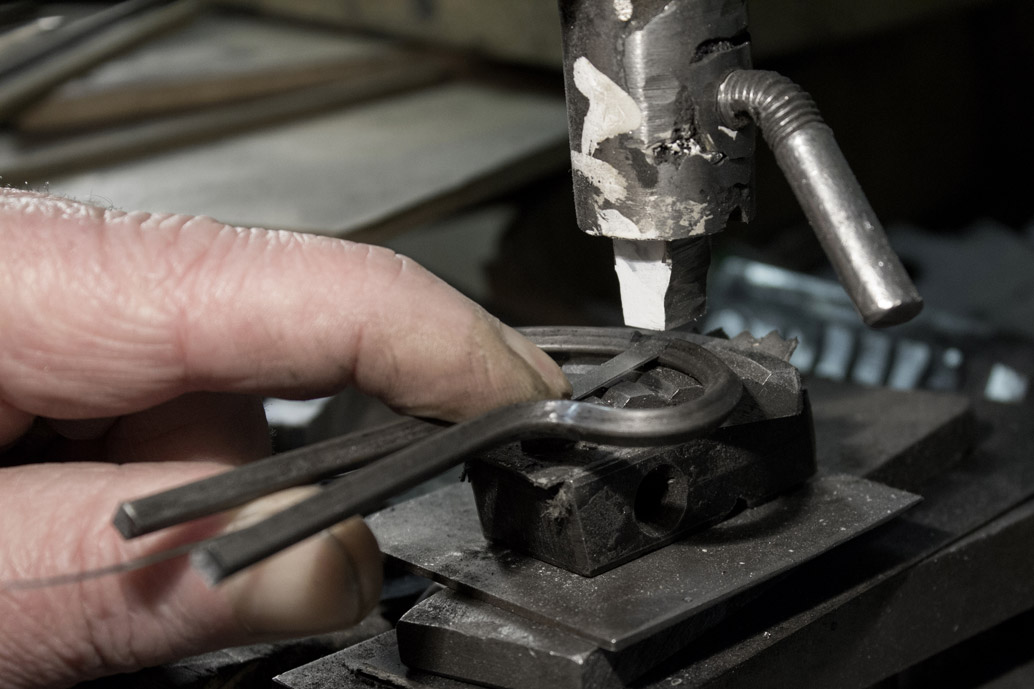
Apart from steel he has experimented with different metals like: brass, copper, aluminium, titanium, beryllium but his very own alloy of steel produced the expected standard.
Do you play the Jew's harp yourself?
Yes, of course, I do. I play it every day since I try the new ones immediately once they are ready. The process is similar to the testing method of car factories: I test the instrument by going to its very boundaries and further and having done that I can be certain whether it will suit the needs of an average customer or not.
Is it a musical or a spiritual instrument for you?
I don't think that musical instruments are mere objects. All musical instruments have a spiritual origin. All instruments represent the abstracted part of the individual. Whatever comes out of the instrument, should it be a rhythm or a tune must represent the spiritual part of the musician. Through the instrument, the musician's soul is revealed and interpreted.
You have a whole library of physics literature and you regularly follow the latest scientific news. Is physics an integral part of making musical instruments?
According to a 1927 quantum mechanical statement, physics itself is a transcendent genre. So here is a tiny thought about quantum mechanics and the psychical world: the statement of quantum mechanics that the observer himself can change the outcome of the experiment gives the observer as a subject particular attention in the indirect creation of reality. So the subject is not a separated, individual, fragmented part of the objective material reality. When you look at the Moon there is information flowing from it into you and vica versa. The two factors subject and object connect to each other deep down on a spiritual level in a way to make an impact on each other. It is enough to observe it. It is also very important to mention from quantum mechanics that the fact of measuring the experiment will change its outcome. The fact that I try to define the tune of a Jew's harp with a tuner I change its sound. The physical work of making a Jew's harp emerges into spiritual work. The mere fact that my hands are obeying the rules of my thoughts itself is quite a transcendent phenomenon. Similarly, it is also a transcendent issue that based on the orders of my brain a musical instrument is created out of nothing and it plays music and people enjoy listening to it. Every single thing in the world that exists is connected to each other. Here I have to cite a famous Asian philosopher, Buddha: 'Do you think that you are all alone? Imagine that you are all knots in a fisherman's net. Can you see? All knots are connected to each other, you are not on your own. Everything connects to everything else. This is the only way you can catch fish.' This is a great spiritual message to mankind, to the individual, that we are not on our own. We are connected, spiritually, we are connected with our family, we are also connected as a community. As members of the universe or multiverse, we are part of that knowledge base, that gigantic treasure box that is created by the mindful entities of the galaxies. This is the greatest worldwide web. Our brain, finely tuned can get hold of this information the same way as one gets information from the internet. Of course, you need the spiritual WiFi that connects us with the huge servers. We are parts of both the material and the spiritual world, that is why all creation elevates us from our flesh and blood selves.
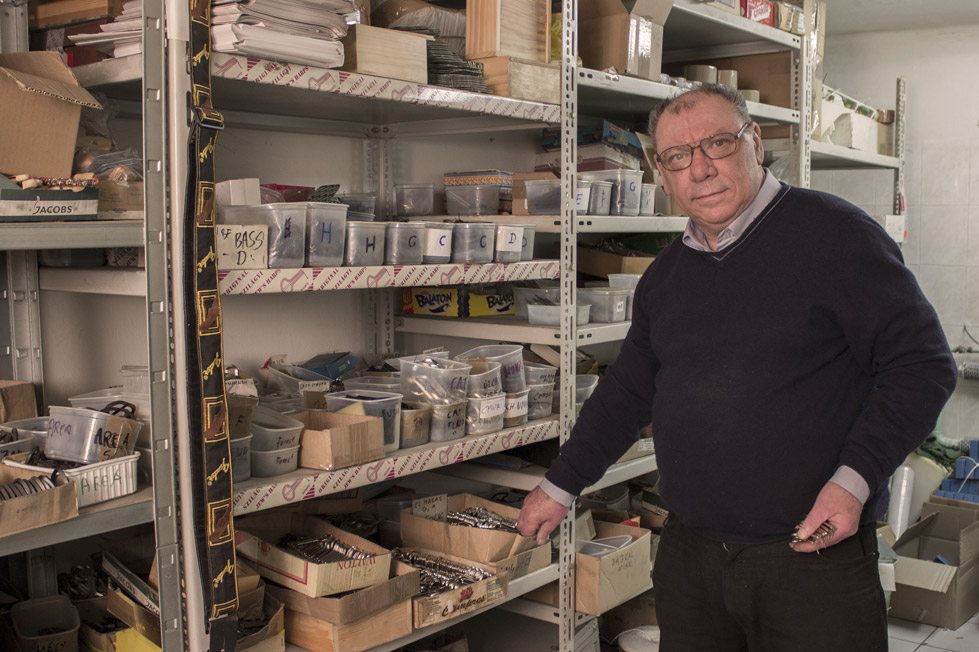
The master claims to have created at least a hundred thousand Jew's harps. He makes more than 60 types regularly that suit even the most sophisticated musical needs and they play almost the entire selection of the audible sounds too.
What was the role of your family in your career?
I am married. My wife is my companion and spiritual partner. I have children and grandchildren too. My older son Áron is a famous Jew's harp player. My younger son, Barnabás is a composer, he lives in the USA. My grandchildren are open to music and the Jew's harp too, of course, they both play the instrument. Family was a ladder to me and I had to climb it. Without a ladder, one cannot jump as high as necessary. I had to rely on my family and they encouraged me step by step to achieve my goals and to do what I had to do. My wife took all the pressure from me in order to make me able to do this...
I cannot imagine that creativity dies with man, I reckon it stays somehow in space-time and passes on from generation to generation. It can infect whole families, communities, a really good baker's thirteenth descendant will still be attached to the smell of flour, the peel and the stove for sure.
Did you manage to reach your goals?
I know very well that reaching your goals is a cliche and that it sounds tacky, nevertheless, I believe that there is something really valuable buried deep in it. I wanted to be a Jew's harp maker and to be able to make a living with it, and that my musical instruments would be known all around the world. I wanted something that would still be here when I'm gone. I will be gone but this interview will still be circulated around through invisible channels and my voice will be heard and shared for a while too. My Jew's harps will also outlive me. All I had to do here in this world was to create something that doesn't have a fore-life but is decent and thriving. So this is what I have done so far: I gave sounds to mankind. You know, as long as someone's playing the Jew's harp, they cannot pull the trigger of a gun. So maybe my instruments support peace to a certain extent. If the meaning of my whole life and my Jew's harps was nothing else but to delay the third world war by a fraction of a second, it was completely worth it.
Translated by Virág Balogi.








